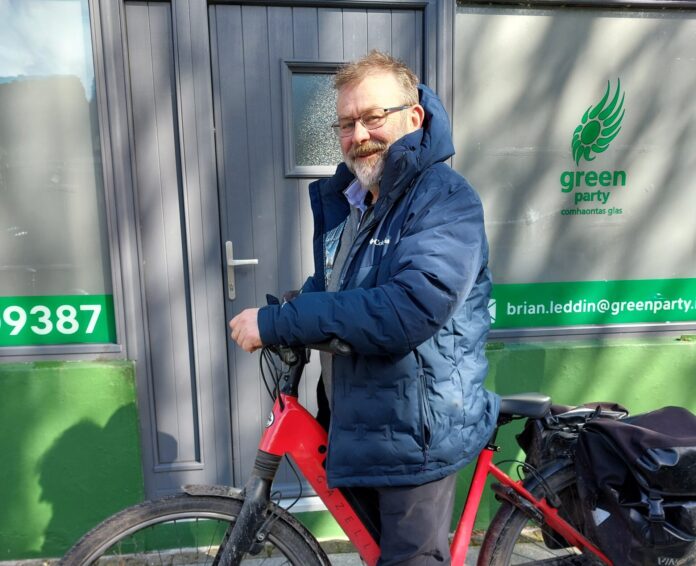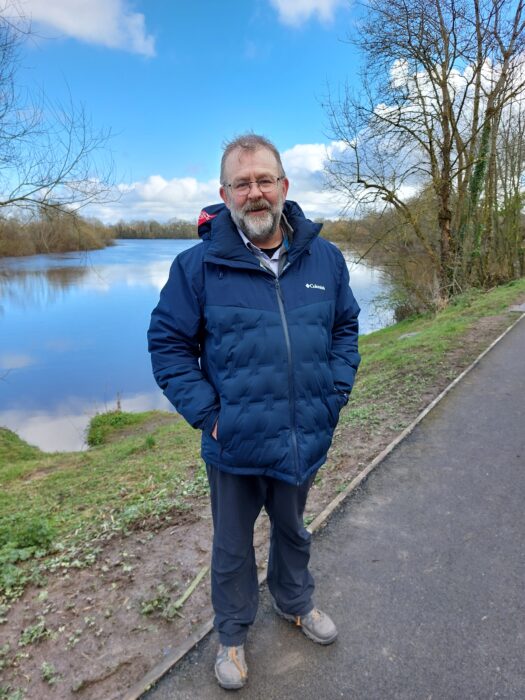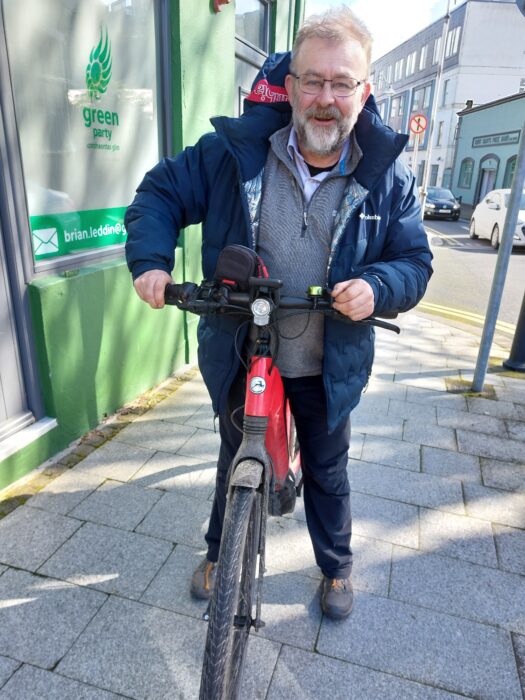
FOR Green Party councillor Seán Hartigan, being in nature is like watching a football match. He mightn’t know his Marcus Rashford from his Mohamed Salah, but he can tell a tufted duck from 500 paces and wax lyrical about the breeding patterns of migratory birds with the same gusto as the lads watching the footie down the pub.
Cllr Hartigan’s knowledge and love of nature and his concern for the environment is infectious. The City East representative is a hugely passionate man and it’s difficult not to be swept up in his fervour.
Seán studied science, agriculture, horticulture, and education to honours degree level at Thomond College of Education and University of Limerick, as well as Environmental Management at postgraduate level in London.
As I head out along Plassey Bank with the former science teacher on a rare sunny April morning, Seán admits to me that sometimes his passion can be mistaken for aggression.
Having watched him in action at meetings in City Hall, I can understand that. He has always struck me as a man who cares greatly. I tell him so and he seems relieved to hear it, instantly seeming more relaxed about our countryside ramble.
“I can argue. I get a bit hyper, but I’d never fall out with anyone. Even in the council chamber, we could be shouting and roaring at each other but when we go outside the door, genuinely, we are the best of buddies,” he tells me.
“Generally, people don’t hold any grudges.”
Born and raised in Thomondgate and currently living in Castleconnell with his wife and five boys, Hartigan is no bluffer. He is a straight-talking ‘Soda Cake’ with a no-nonsense attitude. When he talks about the environment, you get the sense that he isn’t spinning you the Green Party company line.
This man lives and breathes the natural world. It’s his happy place.

Hartigan is like City East’s answer to Grizzly Adams. Caring for the environment and being immersed in nature is a way of life for him. He laughs when I suggest that nature is his Match of the Day.
“That’s it,” he giggles.
“Sometimes people say to me, ‘Did you watch the match last night?’ and I will say, ‘Willie, I have no interest’. Willie will go, ‘I’m the same. I only keep up with it to have a conversation with people’.”
Having said that, Seán, much to his own surprise, was among the 12,000 fans at the famous Munster win over the All Blacks at Thomond Park in 1978.
“I was at the match. I can actually remember a ticket being in a book at home.
“My father would have been into sport. I did a ‘know your sport’ quiz in a magazine and there was 10 questions and all multiple choice. I got two out of ten. I never really got it.”
Move the conversation onto nature, conservation, biodiversity, or the environment and Seán is a different man altogether.
He comes alive, animated and as deeply passionate as any football fan cheering on their team from the terraces.
“We have an amazing amount of wildlife on our doorsteps,” he gushes with schoolboy marvel.
“You can see otters in the middle of Limerick. I’ve seen otters in Lock Quay early in the morning. You can see kingfishers. It’s something we should definitely be promoting. I can’t see many other cities where you can have such access to the country.”
A lot of our environmental issues, Seán believes, can be solved with public transport and Active Travel.
“Your car emits five tonnes of carbon. To take that carbon out of the atmosphere, you’d have to plant 2,500 trees – which would take one hectare of land,” Hartigan muses.
“I don’t know what size a football field is, but I certainly see you fit four or five of them into one hectare. So for everyone driving a car, you’d need to do that for what they put out in carbon. There’s two million cars in the country. We don’t have two million hectares of land for planting trees.”
Seán suggests that Active Travel is the only way forward in reducing our emissions in any meaningful way.
“We have to reduce the number of cars. It can be done. People are willing to do it. It is a relatively compact city. You’d get from Caherdavin over to Dooradoyle on a bike in 15 or 20 minutes. You’d walk it. You can often get around quicker by public transport, walking, or by cycling than you can in a car with traffic jams.
He accepts the argument that not everyone can use a bicycle, but let it never be said that the Green councillor doesn’t practices what he preaches.
In all weather conditions, Seán cycles the 14.5 kilometres between his home in Drominboy, Castleconnell, and his office in Mary Street every single day.
“I might come in first thing in the morning at the crack of dawn and I have Plassey Bank to myself,” he says.
“Once you put on the rain gear, and you have a decent pair of leggings and a good coat, the weather isn’t a problem. To be honest, even if I had the car available to me every day, I would choose the bike over it. It is far less stressful.
“I wouldn’t be able for the stress of being stuck in a traffic jam. Coming home in the evening would take me half an hour to get out in the car. It takes me 40 minutes on the bike and I have got 40 minutes exercise in and washed away the stresses of the day rather than adding to them.
“The only thing is, on a fine summer’s evening, there’s times it has taken me two hours to get home because you could stop talking to a half dozen people along the way,” he confesses.

From an environmental point of view, the Green Party councillor believes that people are mostly concerned with their own personal or local issues on their doorstep, rather than the bigger issue of climate change.
Though, he likes to hope that a lot of people are concerned about the loss of nature.
“Maybe that is something we should be focusing on more than talking about climate. Climate is very abstract and very hard to visualise. Loss of nature is something that people can relate to a lot more.
“People don’t understand or appreciate how much biodiversity we’ve lost, both in this country and worldwide. Species are dying in Ireland. They’re becoming extinct.
“We have 100 bee species and two thirds of them are in danger of extinction and the reason they are in danger of extinction is they don’t have enough habitat. There isn’t enough flowers there for them to feed off. What would have been flower-rich grassland has largely now been turned into a monoculture of Italian rye grass.
“Farmers just want grass because they need to feed cattle, so species are actually dying out because of the way we use our land. I don’t want to see any species dying out.
Hartigan notes that even the mighty mallard duck has been seen to be declining in numbers.
He finds hope in the fact that “kids are getting more education on all this that we ever got, particularly with the Green School projects”.
However, Seán tells me that it is the older generation that are buying more into Green Party policies.
“I think the grandparents are concerned about what planet they are going to leave behind for their grandkids,” he ventures.
“Knocking on the doors you’d be amazed the amount of older people who will say to you, ‘I vote Green because I want to leave a better world behind me’.”
“Sometimes I despair about the younger people. They’ve all gone through Green Schools. There has to be a large percentage of young people out there that are concerned about the environment, but there seems to be a good percentage of them too that are not concerned about the environment.
“Maybe they will change. I don’t know,” he adds.
As a motorist, I take this opportunity to express my own concerns on the Green Party target of having 950,000 electric vehicles on Irish roads by the end of the decade.
“I’m driving an old banger and I’m lucky to have it. How are we all going to afford electric cars?” I ask.
“Well, the most environmentally friendly car that you can get is the one that is already made and they don’t have to extract the metal out of the ground to remake it. So I would say keep driving what you have,” he suggests.
“I don’t believe we are all going to be driving electric cars. We actually have to reduce the number of cars on the road. Electric cars will be an option but there’s plenty of other options as well.
“Sharing cars is actually an option. If you are living in a city, do you need to have a car sitting outside your door not being used for 18 to 20 hours a day?
“I think there’s a lot of young people who will never own a car and don’t want to own a car and see that the financial costs of owning a car are exorbitant. If they are living in a city they can cope very well without a car. They can use public transport and Active Travel.
One underexplored area as regards transport, Hartigan declares, is the retrofitting of electric engines in older cars.
“I’m amazed it hasn’t taken off to any great extent, maybe it has to do with weight. I think there is some people doing it in Ireland with classic cars alright, but wouldn’t you imagine that if you could take out a petrol engine, you could put in an electric engine?”
Further along in our jaunt along Plassey Bank, dozens of cyclists tinkle their bells at Seán and myself to get by as they traverse the scenic route between the city and University of Limerick.
Birds are chirping, busy building nests, and it’s hard not to get swept up in Hartigan’s passion for environmental matters.
A glutton for punishment, I take this opportunity to ask him what I can do to play my part.
“The two biggest things you can do are reduce the amount of meats you are eating and use Active Transport or public transport.
“The next biggest thing after that is improving the insulation in your home. But I think if you are doing those three things, you are doing an awful lot.”
The same day as Seán and myself are taking in the sights and sounds of the riverside, many of his council counterparts are jetting off on junkets Stateside.
I was curious to know if he wasn’t travelling for environmental reasons.
“I like to limit my flights as much as possible,” he says.
“I was out on a trip myself in October to Holland on a cycle study tour with the Active Travel Unit and it was hugely beneficial. I learned a lot there myself and officials from the council learned a lot about cycling infrastructure in Holland.
“But, yes, I am conscious of these things in my everyday life. I think we all need to be conscious of it.
“If somebody wants to go to America, yeah great, but for me personally, to go for four days isn’t worth the plane trip, the time it would take to travel, and the emissions from the travel.
“To be honest, I’m bit of a creature of home as well. I would prefer to go and do a bit of fishing at O’Brien’s Bridge or to go up to the East Clare Lakes or something other than suffer travelling on a plane.
“That’s the truth of it,” he says, surrounded by the blooming green and spring life of his beloved Plassey Banks.


